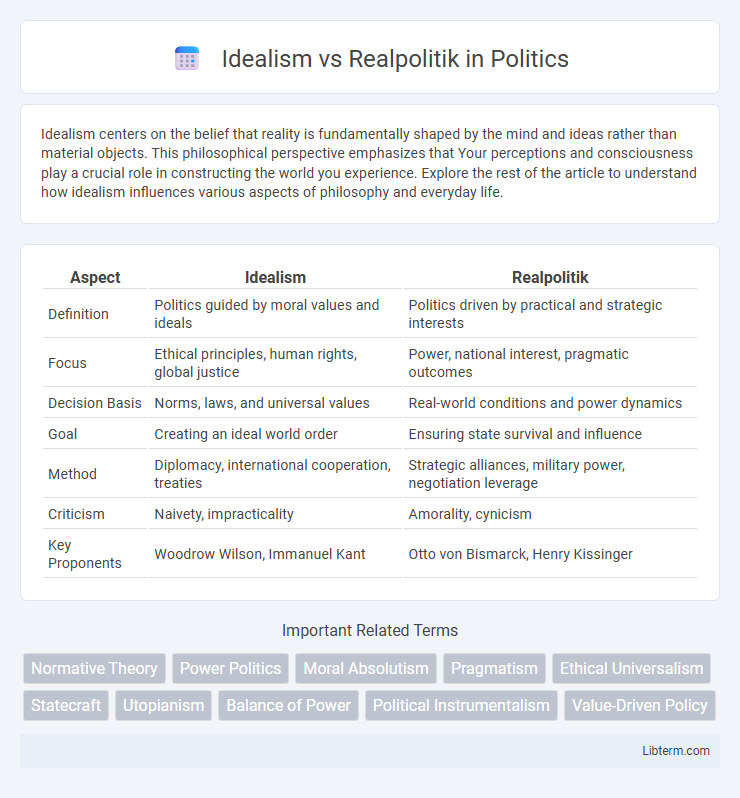Idealism centers on the belief that reality is fundamentally shaped by the mind and ideas rather than material objects. This philosophical perspective emphasizes that Your perceptions and consciousness play a crucial role in constructing the world you experience. Explore the rest of the article to understand how idealism influences various aspects of philosophy and everyday life.
Table of Comparison
| Aspect | Idealism | Realpolitik |
|---|---|---|
| Definition | Politics guided by moral values and ideals | Politics driven by practical and strategic interests |
| Focus | Ethical principles, human rights, global justice | Power, national interest, pragmatic outcomes |
| Decision Basis | Norms, laws, and universal values | Real-world conditions and power dynamics |
| Goal | Creating an ideal world order | Ensuring state survival and influence |
| Method | Diplomacy, international cooperation, treaties | Strategic alliances, military power, negotiation leverage |
| Criticism | Naivety, impracticality | Amorality, cynicism |
| Key Proponents | Woodrow Wilson, Immanuel Kant | Otto von Bismarck, Henry Kissinger |
Defining Idealism and Realpolitik
Idealism in international relations emphasizes moral values, ethical principles, and the pursuit of justice, aiming for a world order grounded in cooperation, human rights, and international law. Realpolitik prioritizes practical and strategic interests, focusing on power, national security, and pragmatic decision-making often devoid of ethical considerations. These contrasting approaches define how states interact, with idealism seeking long-term normative goals and Realpolitik addressing immediate political realities.
Historical Origins of Both Doctrines
Idealism in international relations traces its roots to the post-World War I era, particularly influenced by Woodrow Wilson's vision of a world governed by moral principles and collective security through the League of Nations. Realpolitik originates from 19th-century European power struggles, especially under Otto von Bismarck's leadership in Prussia, emphasizing pragmatic statecraft, power balance, and national interest over moral considerations. Both doctrines emerged from contrasting responses to conflict and diplomacy, with idealism emphasizing ethical norms and realpolitik prioritizing strategic advantage.
Key Philosophers and Political Leaders
Immanuel Kant and Woodrow Wilson represent key idealists who emphasized moral principles and international cooperation in politics. Otto von Bismarck and Henry Kissinger embody Realpolitik, focusing on pragmatic power dynamics and national interests over ethics. These contrasting approaches have shaped diplomatic strategies and global governance theories throughout modern history.
Core Principles and Beliefs
Idealism centers on the belief that ethical norms and international law should guide state behavior, emphasizing cooperation, human rights, and global justice as foundations for peaceful relations. Realpolitik prioritizes pragmatic and strategic interests over moral considerations, focusing on power, security, and national self-interest to navigate the international system. Core to Realpolitik is the acceptance of conflict and competition, while Idealism aspires to transform global politics through shared values and institutions.
Major Examples in International Relations
Idealism in international relations promotes peace through moral principles, exemplified by the establishment of the League of Nations after World War I, aiming to prevent conflicts with collective security and diplomacy. Realpolitik, emphasizing power and pragmatic interests, is demonstrated by Otto von Bismarck's policies in 19th-century Europe and the Cold War dynamics between the United States and the Soviet Union, where strategic alliances and military strength dictated foreign policy decisions. These major examples underscore the contrasting approaches between pursuing ethical ideals and maintaining national interests through political realism.
Successes and Failures of Idealism
Idealism in international relations emphasizes moral values and ethical principles, leading to successes such as the establishment of the United Nations and the promotion of human rights treaties that seek global cooperation and peace. However, idealism often fails when confronted with pragmatic power struggles and national interests, as seen in its inability to prevent conflicts like World War II or to effectively manage crises where strategic interests override ethical considerations. The limitations of idealism become apparent in realpolitik contexts where states prioritize survival, security, and influence over adherence to idealistic goals.
Triumphs and Limitations of Realpolitik
Realpolitik has achieved significant triumphs by enabling pragmatic and strategic decision-making based on power dynamics and national interests, often securing tangible outcomes in diplomacy and conflict resolution. However, its limitations arise from neglecting ethical considerations and long-term ideals, sometimes fostering short-sighted policies that provoke instability or undermine international trust. Balancing realpolitik's focus on realism with idealism's values remains crucial for sustainable and principled global governance.
Modern-Day Applications and Case Studies
Modern-day applications of idealism versus realpolitik are evident in international diplomacy, where countries balance ethical values with strategic interests. Case studies such as the European Union's promotion of human rights contrast with China's pragmatic Belt and Road Initiative, highlighting the tension between normative principles and power politics. These approaches shape global governance, influencing conflict resolution, trade agreements, and alliances in an increasingly multipolar world.
Criticisms and Controversies
Idealism in international relations faces criticism for its perceived naivety and failure to acknowledge power dynamics, often underestimating the role of self-interest and conflict in state behavior. Realpolitik attracts controversy due to its pragmatic, sometimes ruthless approach that prioritizes national interest over ethical considerations, leading to accusations of moral relativism and disregard for international law. The debate between the two centers on the balance between ethical principles and practical power politics, with critics arguing that idealism ignores real-world complexities while Realpolitik risks endorsing cynicism and authoritarianism.
Striking a Balance: Towards a Pragmatic Approach
Striking a balance between Idealism and Realpolitik involves integrating moral principles with practical considerations to achieve sustainable and ethical foreign policy outcomes. Emphasizing diplomatic engagement while acknowledging power dynamics allows nations to pursue long-term goals without sacrificing immediate security interests. This pragmatic approach fosters cooperation and stability by aligning ethical values with realist strategies in international relations.
Idealism Infographic

 libterm.com
libterm.com